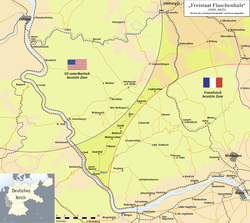Free State of Bottleneck Freistaat Flaschenhals (German) | |||||||||
|---|---|---|---|---|---|---|---|---|---|
| 1919–1923 | |||||||||
 Map of the Free State of Flaschenhals, 1919–1923 | |||||||||
| Status | Unoccupied territory within Post-World War I, Germany | ||||||||
| Capital | Lorch | ||||||||
| Common languages | German | ||||||||
| Demonym(s) | German | ||||||||
| Government | Republic | ||||||||
| President | |||||||||
• 1919–1923 | Edmund Pnischeck | ||||||||
| Historical era | Interwar period, Post-war | ||||||||
• Established | 10 January 1919 | ||||||||
| 23 February 1923 | |||||||||
| Population | |||||||||
• 1920 | 17,363 | ||||||||
| Currency | Freistaattaler | ||||||||
| |||||||||
| Today part of | Germany | ||||||||
| |||||||||
The Free State of Bottleneck (German: Freistaat Flaschenhals) was a short-lived quasi-state that existed from 10 January 1919 until 25 February 1923. It was formed out of part of the Prussian province of Hesse-Nassau as a consequence of the occupation of the Rhineland following World War I. The Bottleneck is now part of the modern German states of Hesse and Rhineland-Palatinate.

